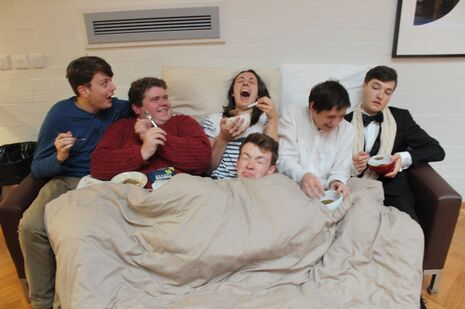Review: Quinoa: A Middle Class Sketch Show
A hit and miss sketch show that really knows how to hit

In the preview I had written for Quinoa, Elliott Wright told me: "I’m interested in making comedy that's a bit more... untidy. I enjoy things that are weird, unsettling, confusing. One of my favourite types of audience laughter is when they don't quite know whether they should laugh, or what they are laughing at." The comedians certainly reflected this goal, but maybe not necessarily in the way that Wright envisioned. The show was indeed often confusing, a symptom of its experimental style, but the untidiness did not always manifest itself in absurdity, but rather in the rough edges of the performance itself. The show felt very unpolished: the comic timing was often poor and many of the actors stumbled on their lines or failed to vocalise properly. Simple absences of props, such as those of wine glasses or bottles, problems that could easily be rectified, only accentuated the air of unprofessionalism.
This said, when the comedians were true to this idea, the show really thrived. It was the sillier moments of the production which were the finest (Michael Tigchelaar’s lizard was particularly praiseworthy), but these often didn’t relate back to the unifying premise of ‘middle-class’ comedy, or a satire of the ‘’safe’ humour it purports to contain’ as Wright puts it. Seth Kruger declaring that he went to a state school (…once) in a refined middle-class accent set an exciting precedent for the class-based comedy yet many of the middle-class allusions were stale and repetitive, and it often ventured into the territory of the relationship between the middle-class and the working-class. These jokes did not seem self-satirising nor did they pay dividends, and thus their extraneousness was acutely felt across the room. The overarching frame of Stephen Fry’s ghost, who awakens the cast in their ‘comically oversized bed’ demanding of them the revitalisation of sketch comedy, was very loose, and seemed to be included as necessary cohesive as opposed to anything particularly clever or funny.
If the show continued as it began then I would be writing a five-star review. The opening sketches were undoubtedly the strongest and had me laughing harder than I have at any other show this term, but the show sadly ran out of steam.
Incidentally, the two comedians who did not strictly conform to ‘white middle-class male’ stereotype added a fantastic twang to the show. During one sketch, Seth Kruger comments on Evie Butcher's inclusion: ‘for the sake of diversity’. This allusion was comfortable comedy solely because Evie Butcher not only managed to hold her own, but in many incidences was the finest comic on stage, with her versatility manifesting itself in everything from birds to a quintessentially British lady. Stefan’ Bencik’s role as the foreign outsider grew tiresome as the show went on; however, it also accommodated some of the finest lines of the entire show (of particular note during the ‘obligatory’ Pokémon sketch). Stefan’s performance was the most polarised of the show; he often didn’t express his lines with enough clarity or conviction as many punch-lines went amiss, but when he was at his finest, particularly in the scenes more dependent on physical comedy, he was utterly superb. The scene in the charcuterie between Evie and Stefan, which brought together these two comedians at their finest, was possibly the best in the whole show, combining a middle-class woman’s fantasy in the quotidian setting of the supermarket with clever puns and hilarious physical theatre.
Elliot Wright’s aforementioned aims only materialised very intermittently throughout the production, and in fact, this was when the production was its finest: Pokémon, lad’s banter, Nando’s, and a controversial final sketch. Attempting to tie these sketches back to ‘middle-class’ problems felt rather contrived, and indeed, they held little relevance to the framing device, except the odd ‘Fry’ pun. Do not mistake this rating for mediocrity: when the jokes were bad, they were very bad, but when they worked, they really worked. The finest jokes were the finest I have seen in Cambridge all term, but this production was prevented from hitting the heights to which it aspired by inconsistency.
 News / SU reluctantly registers controversial women’s soc18 December 2025
News / SU reluctantly registers controversial women’s soc18 December 2025 Features / Should I stay or should I go? Cambridge students and alumni reflect on how their memories stay with them15 December 2025
Features / Should I stay or should I go? Cambridge students and alumni reflect on how their memories stay with them15 December 2025 News / Dons warn PM about Vet School closure16 December 2025
News / Dons warn PM about Vet School closure16 December 2025 News / Cambridge study finds students learn better with notes than AI13 December 2025
News / Cambridge study finds students learn better with notes than AI13 December 2025 Comment / The magic of an eight-week term15 December 2025
Comment / The magic of an eight-week term15 December 2025








